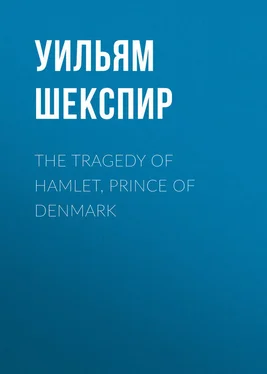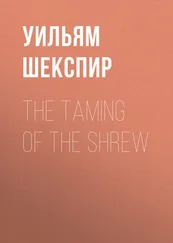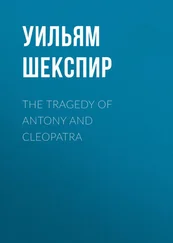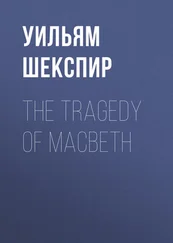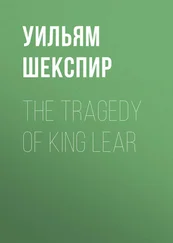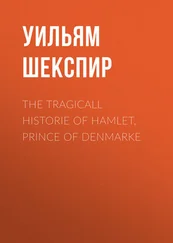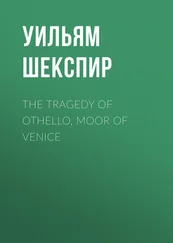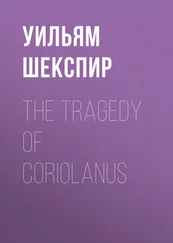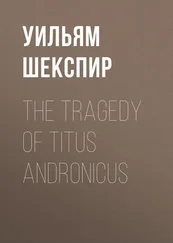Уильям Шекспир - The Tragedy of Hamlet, Prince of Denmark
Здесь есть возможность читать онлайн «Уильям Шекспир - The Tragedy of Hamlet, Prince of Denmark» — ознакомительный отрывок электронной книги совершенно бесплатно, а после прочтения отрывка купить полную версию. В некоторых случаях можно слушать аудио, скачать через торрент в формате fb2 и присутствует краткое содержание. Жанр: Европейская старинная литература, Драматургия, foreign_dramaturgy, на английском языке. Описание произведения, (предисловие) а так же отзывы посетителей доступны на портале библиотеки ЛибКат.
- Название:The Tragedy of Hamlet, Prince of Denmark
- Автор:
- Жанр:
- Год:неизвестен
- ISBN:нет данных
- Рейтинг книги:3 / 5. Голосов: 1
-
Избранное:Добавить в избранное
- Отзывы:
-
Ваша оценка:
- 60
- 1
- 2
- 3
- 4
- 5
The Tragedy of Hamlet, Prince of Denmark: краткое содержание, описание и аннотация
Предлагаем к чтению аннотацию, описание, краткое содержание или предисловие (зависит от того, что написал сам автор книги «The Tragedy of Hamlet, Prince of Denmark»). Если вы не нашли необходимую информацию о книге — напишите в комментариях, мы постараемся отыскать её.
The Tragedy of Hamlet, Prince of Denmark — читать онлайн ознакомительный отрывок
Ниже представлен текст книги, разбитый по страницам. Система сохранения места последней прочитанной страницы, позволяет с удобством читать онлайн бесплатно книгу «The Tragedy of Hamlet, Prince of Denmark», без необходимости каждый раз заново искать на чём Вы остановились. Поставьте закладку, и сможете в любой момент перейти на страницу, на которой закончили чтение.
Интервал:
Закладка:
Enter Horatio, Marcellus, and Bernardo.
Hor. Hail to your lordship!
Ham. I am glad to see you well.
Horatio! – or I do forget myself.
Hor. The same, my lord, and your poor servant ever.
Ham. Sir, my good friend- I'll change that name with you.
And what make you from Wittenberg, Horatio?
Marcellus?
Mar. My good lord!
Ham. I am very glad to see you. – [To Bernardo] Good even, sir. -
But what, in faith, make you from Wittenberg?
Hor. A truant disposition, good my lord.
Ham. I would not hear your enemy say so,
Nor shall you do my ear that violence
To make it truster of your own report
Against yourself. I know you are no truant.
But what is your affair in Elsinore?
We'll teach you to drink deep ere you depart.
Hor. My lord, I came to see your father's funeral.
Ham. I prithee do not mock me, fellow student.
I think it was to see my mother's wedding.
Hor. Indeed, my lord, it followed hard upon.
Ham. Thrift, thrift, Horatio! The funeral bak'd meats
Did coldly furnish forth the marriage tables.
Would I had met my dearest foe in heaven
Or ever I had seen that day, Horatio!
My father- methinks I see my father.
Hor. O, where, my lord?
Ham. In my mind's eye, Horatio.
Hor. I saw him once. He was a goodly king.
Ham. He was a man, take him for all in all.
I shall not look upon his like again.
Hor. My lord, I think I saw him yesternight.
Ham. Saw? who?
Hor. My lord, the King your father.
Ham. The King my father?
Hor. Season your admiration for a while
With an attent ear, till I may deliver
Upon the witness of these gentlemen,
This marvel to you.
Ham. For God's love let me hear!
Hor. Two nights together had these gentlemen
(Marcellus and Bernardo) on their watch
In the dead vast and middle of the night
Been thus encount'red. A figure like your father,
Armed at point exactly, cap-a-pe,
Appears before them and with solemn march
Goes slow and stately by them. Thrice he walk'd
By their oppress'd and fear-surprised eyes,
Within his truncheon's length; whilst they distill'd
Almost to jelly with the act of fear,
Stand dumb and speak not to him. This to me
In dreadful secrecy impart they did,
And I with them the third night kept the watch;
Where, as they had deliver'd, both in time,
Form of the thing, each word made true and good,
The apparition comes. I knew your father.
These hands are not more like.
Ham. But where was this?
Mar. My lord, upon the platform where we watch'd.
Ham. Did you not speak to it?
Hor. My lord, I did;
But answer made it none. Yet once methought
It lifted up it head and did address
Itself to motion, like as it would speak;
But even then the morning cock crew loud,
And at the sound it shrunk in haste away
And vanish'd from our sight.
Ham. 'Tis very strange.
Hor. As I do live, my honour'd lord, 'tis true;
And we did think it writ down in our duty
To let you know of it.
Ham. Indeed, indeed, sirs. But this troubles me.
Hold you the watch to-night?
Both [Mar. and Ber.] We do, my lord.
Ham. Arm'd, say you?
Both. Arm'd, my lord.
Ham. From top to toe?
Both. My lord, from head to foot.
Ham. Then saw you not his face?
Hor. O, yes, my lord! He wore his beaver up.
Ham. What, look'd he frowningly.
Hor. A countenance more in sorrow than in anger.
Ham. Pale or red?
Hor. Nay, very pale.
Ham. And fix'd his eyes upon you?
Hor. Most constantly.
Ham. I would I had been there.
Hor. It would have much amaz'd you.
Ham. Very like, very like. Stay'd it long?
Hor. While one with moderate haste might tell a hundred.
Both. Longer, longer.
Hor. Not when I saw't.
Ham. His beard was grizzled- no?
Hor. It was, as I have seen it in his life,
A sable silver'd.
Ham. I will watch to-night.
Perchance 'twill walk again.
Hor. I warr'nt it will.
Ham. If it assume my noble father's person,
I'll speak to it, though hell itself should gape
And bid me hold my peace. I pray you all,
If you have hitherto conceal'd this sight,
Let it be tenable in your silence still;
And whatsoever else shall hap to-night,
Give it an understanding but no tongue.
I will requite your loves. So, fare you well.
Upon the platform, 'twixt eleven and twelve,
I'll visit you.
All. Our duty to your honour.
Ham. Your loves, as mine to you. Farewell.
My father's spirit- in arms? All is not well.
I doubt some foul play. Would the night were come!
Till then sit still, my soul. Foul deeds will rise,
Though all the earth o'erwhelm them, to men's eyes.
Exit.
Scene III. Elsinore. A room in the house of Polonius
Enter Laertes and Ophelia.
Laer. My necessaries are embark'd. Farewell.
And, sister, as the winds give benefit
And convoy is assistant, do not sleep,
But let me hear from you.
Oph. Do you doubt that?
Laer. For Hamlet, and the trifling of his favour,
Hold it a fashion, and a toy in blood;
A violet in the youth of primy nature,
Forward, not permanent- sweet, not lasting;
The perfume and suppliance of a minute;
No more.
Oph. No more but so?
Laer. Think it no more.
For nature crescent does not grow alone
In thews and bulk; but as this temple waxes,
The inward service of the mind and soul
Grows wide withal. Perhaps he loves you now,
And now no soil nor cautel doth besmirch
The virtue of his will; but you must fear,
His greatness weigh'd, his will is not his own;
For he himself is subject to his birth.
He may not, as unvalued persons do,
Carve for himself, for on his choice depends
The safety and health of this whole state,
And therefore must his choice be circumscrib'd
Unto the voice and yielding of that body
Whereof he is the head. Then if he says he loves you,
It fits your wisdom so far to believe it
As he in his particular act and place
May give his saying deed; which is no further
Than the main voice of Denmark goes withal.
Then weigh what loss your honour may sustain
If with too credent ear you list his songs,
Or lose your heart, or your chaste treasure open
To his unmast'red importunity.
Fear it, Ophelia, fear it, my dear sister,
And keep you in the rear of your affection,
Out of the shot and danger of desire.
The chariest maid is prodigal enough
If she unmask her beauty to the moon.
Virtue itself scopes not calumnious strokes.
The canker galls the infants of the spring
Too oft before their buttons be disclos'd,
And in the morn and liquid dew of youth
Contagious blastments are most imminent.
Be wary then; best safety lies in fear.
Youth to itself rebels, though none else near.
Oph. I shall th' effect of this good lesson keep
As watchman to my heart. But, good my brother,
Do not as some ungracious pastors do,
Show me the steep and thorny way to heaven,
Whiles, like a puff'd and reckless libertine,
Himself the primrose path of dalliance treads
And recks not his own rede.
Laer. O, fear me not!
Enter Polonius.
I stay too long. But here my father comes.
A double blessing is a double grace;
Occasion smiles upon a second leave.
Pol. Yet here, Laertes? Aboard, aboard, for shame!
The wind sits in the shoulder of your sail,
And you are stay'd for. There- my blessing with thee!
And these few precepts in thy memory
Look thou character. Give thy thoughts no tongue,
Nor any unproportion'd thought his act.
Be thou familiar, but by no means vulgar:
Those friends thou hast, and their adoption tried,
Grapple them unto thy soul with hoops of steel;
But do not dull thy palm with entertainment
Of each new-hatch'd, unfledg'd comrade. Beware
Of entrance to a quarrel; but being in,
Bear't that th' opposed may beware of thee.
Give every man thine ear, but few thy voice;
Take each man's censure, but reserve thy judgment.
Costly thy habit as thy purse can buy,
But not express'd in fancy; rich, not gaudy;
For the apparel oft proclaims the man,
And they in France of the best rank and station
Are most select and generous, chief in that.
Neither a borrower nor a lender be;
For loan oft loses both itself and friend,
And borrowing dulls the edge of husbandry.
This above all- to thine own self be true,
And it must follow, as the night the day,
Thou canst not then be false to any man.
Farewell. My blessing season this in thee!
Laer. Most humbly do I take my leave, my lord.
Pol. The time invites you. Go, your servants tend.
Laer. Farewell, Ophelia, and remember well
What I have said to you.
Oph. 'Tis in my memory lock'd,
And you yourself shall keep the key of it.
Laer. Farewell. Exit.
Pol. What is't, Ophelia, he hath said to you?
Oph. So please you, something touching the Lord Hamlet.
Pol. Marry, well bethought!
'Tis told me he hath very oft of late
Given private time to you, and you yourself
Have of your audience been most free and bounteous.
If it be so- as so 'tis put on me,
And that in way of caution- I must tell you
You do not understand yourself so clearly
As it behooves my daughter and your honour.
What is between you? Give me up the truth.
Oph. He hath, my lord, of late made many tenders
Of his affection to me.
Pol. Affection? Pooh! You speak like a green girl,
Unsifted in such perilous circumstance.
Do you believe his tenders, as you call them?
Oph. I do not know, my lord, what I should think,
Pol. Marry, I will teach you! Think yourself a baby
That you have ta'en these tenders for true pay,
Which are not sterling. Tender yourself more dearly,
Or (not to crack the wind of the poor phrase,
Running it thus) you'll tender me a fool.
Oph. My lord, he hath importun'd me with love
In honourable fashion.
Pol. Ay, fashion you may call it. Go to, go to!
Oph. And hath given countenance to his speech, my lord,
With almost all the holy vows of heaven.
Pol. Ay, springes to catch woodcocks! I do know,
When the blood burns, how prodigal the soul
Lends the tongue vows. These blazes, daughter,
Giving more light than heat, extinct in both
Even in their promise, as it is a-making,
You must not take for fire. From this time
Be something scanter of your maiden presence.
Set your entreatments at a higher rate
Than a command to parley. For Lord Hamlet,
Believe so much in him, that he is young,
And with a larger tether may he walk
Than may be given you. In few, Ophelia,
Do not believe his vows; for they are brokers,
Not of that dye which their investments show,
But mere implorators of unholy suits,
Breathing like sanctified and pious bawds,
The better to beguile. This is for all:
I would not, in plain terms, from this time forth
Have you so slander any moment leisure
As to give words or talk with the Lord Hamlet.
Look to't, I charge you. Come your ways.
Oph. I shall obey, my lord.
Интервал:
Закладка:
Похожие книги на «The Tragedy of Hamlet, Prince of Denmark»
Представляем Вашему вниманию похожие книги на «The Tragedy of Hamlet, Prince of Denmark» списком для выбора. Мы отобрали схожую по названию и смыслу литературу в надежде предоставить читателям больше вариантов отыскать новые, интересные, ещё непрочитанные произведения.
Обсуждение, отзывы о книге «The Tragedy of Hamlet, Prince of Denmark» и просто собственные мнения читателей. Оставьте ваши комментарии, напишите, что Вы думаете о произведении, его смысле или главных героях. Укажите что конкретно понравилось, а что нет, и почему Вы так считаете.
